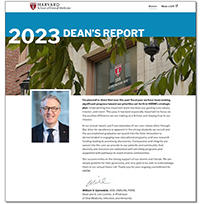
Dr. Hawazin W. Elani, assistant professor in the Department of Oral Health Policy and Epidemiology at Harvard School of Dental Medicine (HSDM), and co-authors from the Harvard T. H. Chan School of Public Health, examined how the Affordable Care Act’s (ACA) expansion of Medicaid eligibility affected dental coverage and the use of oral health services among low-income adults, using data from the National Health Interview Survey. Their findings were published this week in a Health Affairs article “Changes In Coverage And Access To Dental Care Five Years After ACA Medicaid Expansion.”
The authors found that the ACA increased rates of dental coverage by 18.9 percentage points in states that provide dental benefits through Medicaid.
“In terms of utilization, expansion states that provide dental benefits saw the greatest increase in people having a dental visit in the past year (7.2 percentage points). However, there was no significant change in the overall share of people who had a dental visit in the past year, although the expansion was associated with a significant increase in this metric among white adults,” the authors said.
The authors also noted that the expansion was associated with finding an increase in complete teeth loss, suggesting that once low-income adults gained access to dental services, the condition of their oral health was in a deteriorated state and necessitated extraction.
“Ensuring routine access to preventive oral health services could therefore improve oral health and prevent teeth loss in the low-income population,” the authors said.
Their findings suggest that there are other persistent barriers to access to dental care, particularly among members of racial and ethnic minority groups.
“As noted in Dr. Elani's article, coverage for and access to dental services have been challenges for vulnerable populations for many years,” said Jane Barrow, associate dean for Global and Community Health and executive director of HSDM’s Initiative to Integrate Oral Health and Medicine.
“Policy makers have struggled with measuring improvements to oral health through public programs, particularly among adult Medicaid beneficiaries. Dr. Elani's work provides new insights into the impact of the ACA on dental coverage, as well as on access to dental care in a robust and rigorous way. We are excited about the visibility this article will give to oral health policy issues, and look forward to further study.”


